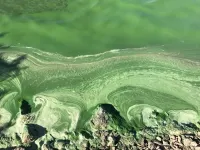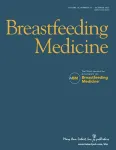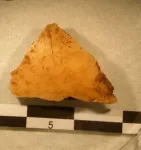(Press-News.org) Washington, DC— As climate change warms the Earth, higher-latitude regions will be at greater risk for toxins produced by algal blooms, according to new research led by Carnegie’s Anna Michalak, Julian Merder, and Gang Zhao. Their findings, published in Nature Water, identify water temperatures of 20 to 25 degrees Celsius (68 to 77 degrees Fahrenheit) as being at the greatest risk for developing dangerous levels of a common algae-produced toxin called microcystin.
Harmful algal blooms result when bodies of water get overloaded with nitrogen and phosphorus runoff from agriculture and other human activities. These excess nutrients can allow blue-green algae populations to grow at an out-of-control rate.
Some blue-green algal species produce a toxin called microcystin, which can pose a serious health hazard to people and the environment, as well as pose economic risks for fishing and tourism. Microcystin affects liver function and can cause death in wild and domestic animals, including humans in rare instances. It is also classified as a potential carcinogen in cases of chronic exposure.
“In 2014 an algal bloom in Lake Erie led to high levels of microcystin in water intakes, and residents in Ohio and Ontario were instructed not to drink tap water due to risk of exposure,” Merder cautioned.
Merder, Michalak, and their colleagues—Carnegie’s Gang Zhao, University of Kansas’s Ted Harris, and Dimitrios Stasinopoulos and Robert Rigby of the University of Greenwich—analyzed samples taken from 2,804 U.S. lakes between 2007 and 2017. They assessed how water temperature affects the occurrence and concentration of microcystin as part of an effort to better understand the risks to water quality posed by climate change.
Michalak’s lab has taken a leading role in understanding the intersection of climate change and water quality impairments for more than a decade. Previous work has shown that lakes worldwide are already experiencing more severe algal blooms and that nutrient pollution is being exacerbated by changes in rainfall patterns.
“Lakes are sentinels of climate change,” Michalak said. “They hold the vast majority, 87 percent, of the liquid freshwater on the Earth’s surface, and the warming and precipitation shifts associated with climate change pose some of the greatest threats to water quality around the world and to the health of aquatic ecosystems.”
The surface temperatures of lakes have already been warming at 0.34 degrees Celsius (0.61 degrees Fahrenheit) per decade and Merder and Michalak set out to determine what this, as well as future warming, would mean in terms of risk for elevated toxin concentrations.
“The abundance of blue-green algae is predicted to increase due to climate change as they outcompete other species,” Merder explained. “But previous field studies came to various conclusions about what this means for microcystin concentrations.”
To inform land and water management strategies, it was important to quantitatively tie toxin levels to water temperature, which Merder and Michalak were able to accomplish through their extensive analysis of lake water samples, revealing that water temperatures in the 20 to 25 degrees Celsius (68 to 77 degrees Fahrenheit) range were most dangerous in terms of elevated microcystin concentrations. They also found that the impact of temperature is amplified when nutrient concentrations are high.
By incorporating information from climate models, they were able to demonstrate that areas most susceptible to high toxin concentrations will continue to move northward. In some areas, the relative risk of exceeding water quality guidelines will increase by up to 50 percent in the coming decades. Additionally, they showed that toxin hazards will decrease in a small number of regions further south, as water temperatures begin to exceed those associated with the highest risk.
“These findings should help demonstrate the serious risk to safe water for drinking, fishing, recreation, and other societal needs in many parts of the United States and the urgency for developing management strategies to prepare,” Michalak concluded. “When we think about water sustainability in the context of global change, we need to focus on the quality of the water as much as we focus on the amount of water.”
END
Climate is increasing risk of high toxin concentrations in Northern US lakes
When we think about water sustainability in the context of global change, we need to focus on the quality of the water as much as we focus on the amount of water
2023-10-23
ELSE PRESS RELEASES FROM THIS DATE:
Breastfeeding in the setting of substance use
2023-10-23
The Academy of Breastfeeding Medicine (ABM) has released new literature-based recommendations related to breastfeeding in the setting of substance use and substance use disorder (SUD) treatments. The new clinical protocol is published in the peer-reviewed journal Breastfeeding Medicine. Click here to read the article now.
Miriam Harris, MD and Elisha Wachman, MD, from Boston Medical Center, and coauthors, provide breastfeeding recommendations in the setting of non-prescribed opioid, stimulant, sedative-hypnotic, alcohol, nicotine, and cannabis use, and SUD treatments. They also offer guidance on the use of toxicology testing in breastfeeding ...
New exoplanet-informed research sets clearer bounds on the search for radio technosignatures
2023-10-23
A new study leverages the NASA Exoplanet Archive and planetary system simulations to make narrowband SETI searches more efficient.
October 23, 2023, Mountain View, CA -- In a new study published in the Astronomical Journal, researchers used the known population of exoplanets and extrapolated to the much larger, unknown population of exoplanets to set better thresholds for planetary effects on signals from ETIs (extraterrestrial intelligences). The prior recommendation for the threshold “drift rate” contribution, caused by a planet’s motion around its host star, was 200 nHz. In this work, lead ...
Navigating the future of skin health: The 14Th International Conference on Skin Ageing & Challenges 2023
2023-10-23
Lisbon, Portugal – 23 October, 2023
The International Society of Microbiota (ISM) is proud to present the 14th International Conference on Skin Ageing & Challenges 2023. This monumental event will unfold at the Altis Grand Hotel in Lisbon, Portugal, and virtually, on November 9-10, 2023.
Skin ageing, a multifaceted issue combining both basic research, mechanistic, clinical aspects and health concerns, is gaining significant attention in the scientific community.
This year’s conference promises to be a beacon of innovation, ...
Gut fungi's lasting impact on severe COVID-19 immune response
2023-10-23
Certain gut-dwelling fungi flourish in severe cases of COVID-19, amplifying the excessive inflammation that drives this disease while also causing long-lasting changes in the immune system, according to a new study led by investigators at Weill Cornell Medicine and NewYork-Presbyterian. This discovery identifies a group of patients who may benefit from specialized, but yet-to-be determined treatments.
Utilizing patient samples and preclinical models, the research team determined that the growth of fungi in the intestinal ...
Who were the first modern humans to settle in Europe?
2023-10-23
Before modern humans settled definitively in Europe, other human populations left Africa for Europe beginning approximately 60,000 years ago, albeit without settling for the long term. This was due to a major climatic crisis 40,000 years ago, combined with a super-eruption originating from the Phlegraean Fields volcanic area near current-day Naples, subsequently precipitating a decline in ancient European populations. To determine who the first modern humans to settle definitively in Europe were, a team led by CNRS scientists1 analysed the genome of two skull ...
Alem & Narayanan advancing infectious disease capabilities through Biomedical Research Laboratory core support
2023-10-23
Alem & Narayanan Advancing Infectious Disease Capabilities Through Biomedical Research Laboratory Core Support
Farhang Alem, Interim Director of the Biomedical Research Laboratory, Institute for Biohealth Innovation, and Aarthi Narayanan, Professor, Biology, received funding for the project: "Advancing Infectious Disease Capabilities through BRL Core Support."
As part of this project, Alem and Narayanan will: 1) implement a comprehensive BSL-3 facilities preventative maintenance and upgrade plan to ensure continuity of operations, compliance with federal regulations, and a safe and secure facility; 2) enhance safety ...
Ramseur to receive funding for APA fellowship - APA Minority Fellowship Program (MFP)
2023-10-23
Ramseur To Receive Funding For APA Fellowship - APA Minority Fellowship Program (MFP)
Kevin Ramseur, II, a Mason doctoral student studying clinical psychology, is set to receive funding for: "APA Fellowship – APA Minority Fellowship Program (MFP)."
Ramseur will receive $27,144 from the American Psychological Association on a subaward from the Substance Abuse and Mental Health Services Administration (SAMHSA). This funding will begin in Oct. 2023 and will end in late Sept. 2024.
###
About George Mason University
George Mason ...
Doebel innovating developmental science with an online, scalable meta-science platform for investigating cognitive development during early childhood
2023-10-23
Doebel Innovating Developmental Science With An Online, Scalable Meta-Science Platform For Investigating Cognitive Development During Early Childhood
Sabine Doebel, Assistant Professor, Psychology, received $2,784 from the University of Texas at Dallas on a subaward from the National Science Foundation for: "Subaward Project GARDEN: Innovating Developmental Science with an Online, Scalable Meta-Science Platform for Investigating Cognitive Development During Early Childhood."
Regarding the importance of the project, Doebel said, "Project GARDEN will leverage online methodologies to gather data from a large, ...
Debus-Sherrill receives supplemental funds for elevate academy for juvenile providers
2023-10-23
Debus-Sherrill Receives Supplemental Funds For Elevate Academy For Juvenile Providers
Sara Debus-Sherrill, Senior Research Associate, Center for Advancing Correctional Excellence (ACE!), received $153,424 from County of Alameda for: "Supplemental Funds for Elevate Academy for Juvenile Providers." This funding began in Aug. 2023 and will end in late June 2024.
Debus-Sherrill said, "This project funds the development and delivery of a training academy for community-based organizations providing services to justice-involved youth in Alameda County, California."
###
About George Mason University
George ...
Parsa studying design of joint 3D solid-state learning machines for various cognitive use-cases
2023-10-23
Parsa Studying Design Of Joint 3D Solid-State Learning Machines For Various Cognitive Use-Cases
Maryam Parsa, Assistant Professor, Electrical and Computer Engineering, received funding from the National Science Foundation for the project: "Collaborative Research: NCS-FR: DEJA-VU: Design of Joint 3D Solid-State Learning Machines for Various Cognitive Use-Cases."
In this collaborative project, Parsa joins a team of faculty members from the University of Wisconsin Madison (Dr. Akhilesh Jaiswal), and the University of California Irvine (Dr. Babak Shahbaba and Dr. Norbert ...
LAST 30 PRESS RELEASES:
Scientists show how to predict world’s deadly scorpion hotspots
ASU researchers to lead AAAS panel on water insecurity in the United States
ASU professor Anne Stone to present at AAAS Conference in Phoenix on ancient origins of modern disease
Proposals for exploring viruses and skin as the next experimental quantum frontiers share US$30,000 science award
ASU researchers showcase scalable tech solutions for older adults living alone with cognitive decline at AAAS 2026
Scientists identify smooth regional trends in fruit fly survival strategies
Antipathy toward snakes? Your parents likely talked you into that at an early age
Sylvester Cancer Tip Sheet for Feb. 2026
Online exposure to medical misinformation concentrated among older adults
Telehealth improves access to genetic services for adult survivors of childhood cancers
Outdated mortality benchmarks risk missing early signs of famine and delay recognizing mass starvation
Newly discovered bacterium converts carbon dioxide into chemicals using electricity
Flipping and reversing mini-proteins could improve disease treatment
Scientists reveal major hidden source of atmospheric nitrogen pollution in fragile lake basin
Biochar emerges as a powerful tool for soil carbon neutrality and climate mitigation
Tiny cell messengers show big promise for safer protein and gene delivery
AMS releases statement regarding the decision to rescind EPA’s 2009 Endangerment Finding
Parents’ alcohol and drug use influences their children’s consumption, research shows
Modular assembly of chiral nitrogen-bridged rings achieved by palladium-catalyzed diastereoselective and enantioselective cascade cyclization reactions
Promoting civic engagement
AMS Science Preview: Hurricane slowdown, school snow days
Deforestation in the Amazon raises the surface temperature by 3 °C during the dry season
Model more accurately maps the impact of frost on corn crops
How did humans develop sharp vision? Lab-grown retinas show likely answer
Sour grapes? Taste, experience of sour foods depends on individual consumer
At AAAS, professor Krystal Tsosie argues the future of science must be Indigenous-led
From the lab to the living room: Decoding Parkinson’s patients movements in the real world
Research advances in porous materials, as highlighted in the 2025 Nobel Prize in Chemistry
Sally C. Morton, executive vice president of ASU Knowledge Enterprise, presents a bold and practical framework for moving research from discovery to real-world impact
Biochemical parameters in patients with diabetic nephropathy versus individuals with diabetes alone, non-diabetic nephropathy, and healthy controls
[Press-News.org] Climate is increasing risk of high toxin concentrations in Northern US lakesWhen we think about water sustainability in the context of global change, we need to focus on the quality of the water as much as we focus on the amount of water




